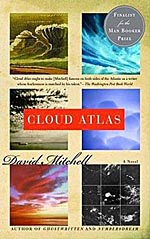
![]() Triseult
Triseult
4/1/2013
![]()
Much has been written about Cloud Atlas's unique Matryoshka doll structure, and although it does explain in large part the appeal and staying power of the novel, it overshadows the elegance of the six novellas that form the meat of the book. Which is a pity, because some of them are truly excellent.
It would have been easy for this novel to devolve into a mere literary gimmick because of its structure; instead, the unique sequence actually manages to illuminate the six individual stories into something that exceeds the sum of their parts. The first half of the book feels like running up a hill; there is very little payoff, and as soon as one story becomes enthralling, we are yanked away to witness a new beginning. But once the central piece is crossed, what follows is a pleasant downhill stroll through stories we have learned to miss in the meantime.
Cloud Atlas's meta-narrative is not as clever and awe-inspiring as, say, Paul Auster's New York Trilogy. For the most part, the meta-story of Cloud Atlas appears through not-so-subtle links with previous stories in the form of hints of reincarnation, as well as unrelated references to the protagonist witnessing the previous story in the series. In some cases, these hints are so heavy-handed as to break the flow of the story with the gauche aplomb of a stage actor winking at the audience. But mostly through its central story and the first story that bookends the novel, a deeper, subtler theme emerges; it hints at the moral destiny of the world, and the struggle between compassion and greed. It traces the tenuous golden thread that links tragedies in the past to moral triumphs in the future. And in this, Mitchell's gambit succeeds and Cloud Atlas transcends its parts.
But the main reason Cloud Atlas succeeds is on strength of its individual stories. Each of them has its appeal, and all of them for very different reasons. While they were not all excellent, at least half were superb and well worth a read. The tale of Robert Frobisher was by far the best, showcasing a unique, wry, and witty voice, some beautiful insight into the meaning of music, and some amazing character exchanges with an old, curmudgeon music composer. Likewise, Mitchell's take on futuristic Seoul in An Orison of Sonmi~451 showed a masterful foray into hard science fiction, without the usual trappings of a literary author trying his hands at the genre. Somni's tale was engaging enough that I would gladly have read it as a standalone novel.
The other stories were not as stellar at these two, but they all found their own special ways to keep me interested. The Luisa Rey story felt less like a virtuoso take on the detective novel, and more like a pastiche. Likewise, the comical tale of Timothy Cavendish was funny, but was at odds with the dramatic tone of the stories that precede and follow it.
Cloud Atlas is a unique novel, both for its structure and for the masterful crossing of genres on display. It takes time to reveal its depth, but once it does, it's a satisfying tour de force, albeit an uneven one. Take heart as you make your way through the first half; once you reach the halfway point, the clouds will come into focus and reveal their depths.